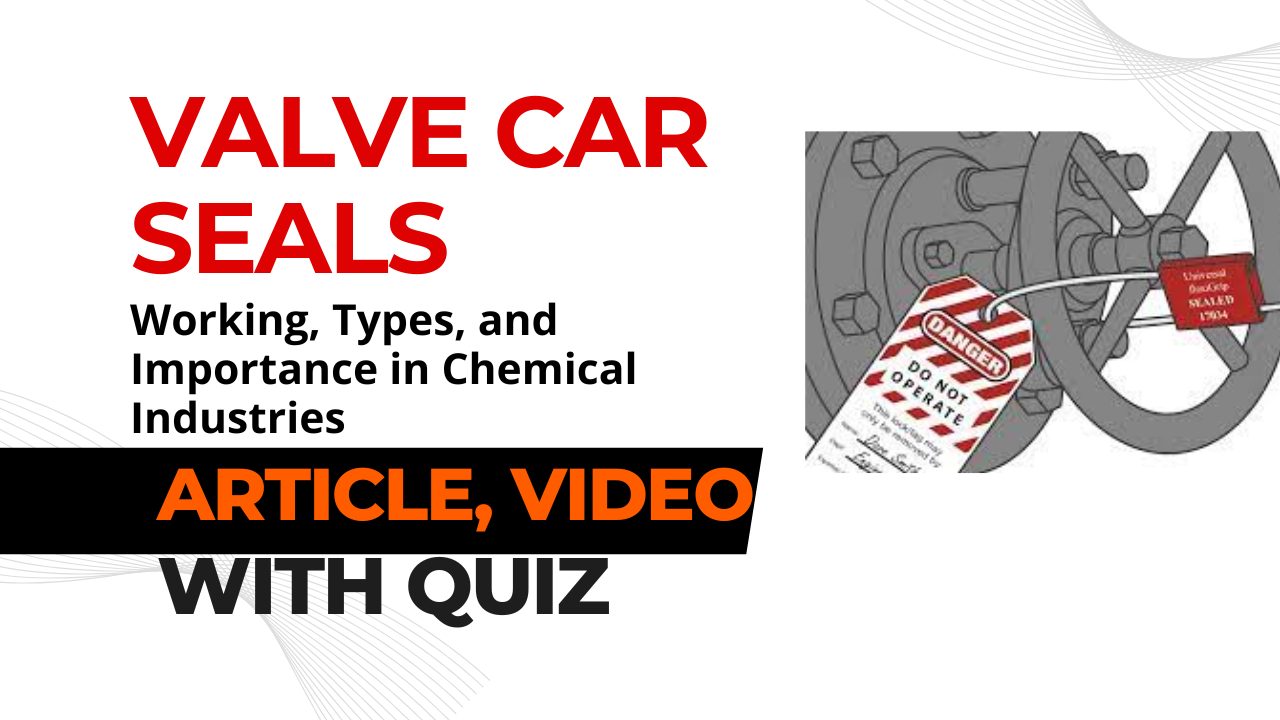Valves play a crucial role in various industries, especially in the chemical sector, where the precise control of fluids is essential. Valve car seals, also known as car seal valves, are a critical component of valve systems in chemical industries. In this comprehensive guide, we will delve into the working principles, different types, and the utmost importance of valve car seals in ensuring safety and efficiency in chemical processes.
Table of Contents
Don’t miss the Complete Course on Piping Engineering: Check Now
By EPCLand.com
Understanding Valve Car Seals
Valve car seals are mechanisms used to secure valves in a specific position, preventing unauthorized or accidental adjustments. These seals are commonly used in critical applications within the chemical industry, where even minor changes in valve settings can lead to catastrophic consequences.
Working of Valve Car Seals
Valve car seals operate on a relatively simple principle. A metal or plastic seal is placed over the valve handle, effectively immobilizing it. This seal can only be removed using specialized tools, ensuring that only authorized personnel can access and adjust the valve.
Types of Valve Car Seals
- Wire Seals: These are basic car seal devices that use a wire to secure the valve handle. The wire is threaded through the seal and around the valve handle, preventing any movement. Wire seals are commonly used for valves that require infrequent adjustments.
- Padlock Seals: Padlock seals provide a higher level of security. A padlock is attached to the valve handle, and the key is retained by authorized personnel. This prevents tampering and ensures that only those with the key can access the valve.
- Plastic Seals: Plastic seals are versatile and tamper-evident. Once the plastic seal is applied, any attempt to adjust the valve will break the seal, providing a clear visual indication of tampering.
Importance of Valve Car Seals in Chemical Industries
Valve car seals play a pivotal role in maintaining safety and operational integrity in chemical industries. Here’s why they are of paramount importance:
- Preventing Unauthorized Adjustments: In chemical processes, maintaining the correct valve settings is critical. Unauthorized adjustments can lead to the release of hazardous materials, posing risks to personnel and the environment. Valve car seals prevent unauthorized access and adjustments.
- Compliance with Regulations: The chemical industry is subject to strict safety regulations. The use of valve car seals helps companies comply with these regulations by ensuring that only trained personnel can interact with valve systems.
- Mitigating Human Error: Human error is a significant factor in accidents. Valve car seals minimize the potential for accidental adjustments, reducing the likelihood of errors that could result in hazardous situations.
- Enhancing Accountability: Valve car seals provide a clear record of who accessed the valve and when. This accountability is crucial for tracking any changes made to the valve system.
FAQs about Valve Car Seals
Q1: What are valve car seals? A1: Valve car seals, also known as car seal valves, are devices used to secure valve handles in specific positions to prevent unauthorized adjustments.
Q2: How do valve car seals work? A2: Valve car seals immobilize valve handles using seals that can only be removed with specialized tools, ensuring authorized access.
Q3: What types of valve car seals are there? A3: Common types include wire seals, padlock seals, and plastic seals, each offering varying levels of security and tamper-evidence.
Q4: Why are valve car seals important in chemical industries? A4: Valve car seals prevent unauthorized adjustments, ensure compliance with safety regulations, mitigate human error, and enhance accountability in chemical processes.
Q5: What are the benefits of using padlock seals? A5: Padlock seals provide a high level of security as they require a key to unlock, preventing tampering and unauthorized access to valves.
In conclusion, valve car seals are a critical component of valve systems in chemical industries. Their working principle, various types, and undeniable importance in ensuring safety, compliance, and operational efficiency make them indispensable tools for maintaining the integrity of chemical processes. Proper implementation of valve car seals safeguards personnel, the environment, and valuable assets, contributing to a safer and more controlled industrial environment.
Recommended courses (Published on EPCLand)
- Basics of Piping Engineering
- Piping Layout Engineering
- Piping Material Engineering
- Piping Stress Analysis
- Complete Course on Piping Engineering
- Material Requisitions
- Piping Material Specifications
- Valve Material Specifications
Don’t miss the published articles on following:
Related Video
Attempt Quiz
Question 1:
What are valve car seals primarily used for?
Explanation: Valve car seals are primarily used for providing airtight closures for valve stems in industrial applications such as oil and gas, chemical, and petrochemical industries.
Question 2:
What is the main purpose of using valve car seals?
Explanation: The main purpose of using valve car seals is to prevent unauthorized access to valves and protect against tampering or contamination.
Question 3:
What type of material is commonly used for valve car seals?
Explanation: Rubber is a common material used for valve car seals due to its flexibility, durability, and ability to create an effective seal.
Question 4:
What is the typical method of attaching valve car seals to valve stems?
Explanation: Valve car seals are typically attached to valve stems using threaded attachment, ensuring a secure and tamper-resistant connection.
Question 5:
What important function do valve car seals serve in industrial settings?
Explanation: Valve car seals play a crucial role in ensuring valve integrity and safety by preventing unauthorized access and tampering, especially in industries where valve systems are critical for process operations.



